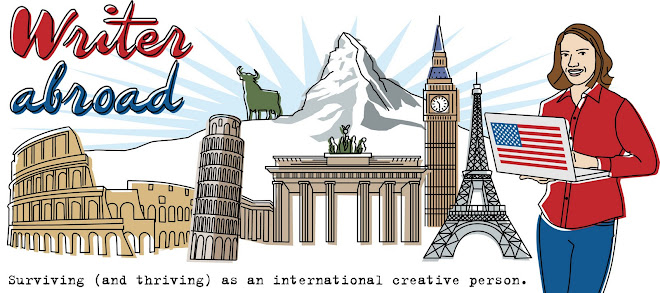Watching Home from Far Away: On Watching the Boston Marathon Bombings
from Japan
On April 16th, 2013, I
had an experience many expatriates have probably shared at one some point:
sitting in my living room watching news unfold on a TV screen, news occurring
in a place that’s both home and half a planet away.
The sun was filtering through the soji-screen covering the windows of the tatami room where our TV sits, in the
apartment I share with my Japanese husband in Osaka. Pale morning light spread
across the straw-matted floor in front of the screen, where in slow-motion,
Marathon runners buckled and tipped, gray smoke propelling outward in angry
billows. Event officials in bright yellow jackets swarmed over gray metal
barricades. Spectators sat clutching limbs or carried wounded strangers, their
faces all etched in shock.
I was watching my home, Boston,
after the bombings at the Marathon. Behind the slow-moving mayhem on the screen,
I could see the street corner where my drug store was, the store fronts I had
passed and sidewalk I had tread hundreds of times as a life-long Bostonian,
pre-marriage and pre-expatriatism. As a teenager, I’d lived just two blocks
from the first bomb; as an adult, just a few blocks further from the second,
until, at 36, I fell madly in love with a man from Osaka and left my hometown
for his.
The carnage in Boston, as I watched
it in Osaka, felt both very close and very far. It was nighttime now in Boston,
and the footage I was watching was a few hours old. In the morning sunshine, I
sat and watched and was shaken and sad. I thought about the darkness shrouding,
at that very moment, the streets of my home where the bombs had detonated, now
reflected back to me in a way that felt both immediate and time-delayed, viscerally
near and ineffably out-of-reach.
My body itched with the impulse not
just to do something—not just to react in some way besides gaping, as
I stared dumbly at the TV—but to somehow dispel the weird duality of
experiencing home and its pain from the remove of continents. I wanted suddenly
to, somehow, literally touch the streets of my neighborhood as they were now
touching me in my chest, at the same time that they remained flat and grainy and
intangible from behind the sturdy glass of the TV screen.
So I did the only thing I could
think of, as not just an expatriate but a writer abroad: I wrote. I wrote about
how, although I left my first love, Boston, for my second love, my Japanese
husband in Osaka, I never lost my primal connection to the city I will always
call home. Although it could do nothing
for the lives and limbs lost in Copley Square that day, writing reminded me of
why, no matter where I go and what new things I see and learn, I’ve always
belonged to Boston first, and always will: just one tiny, inconsequential blip
of an offering for a city I knew would need somehow to start to heal, and I’d
have nothing much to offer it while it did. Except, of course, my love.
If you’re interested, here
is what I wrote. Either way, I hope we as expat writers all keep telling
the stories of where we are from, and of how that very telling helps each of us
hold and share and even create anew our connection to and our pride in our
home, even from oceans away.
Tracy
Slater is a freelance writer and the founder of the award-winning global
literary series Four Stories. Her book The
Good Shufu: A Wife in Search of a
Life Between East and West, is forthcoming from Penguin’s Putnam imprint.

